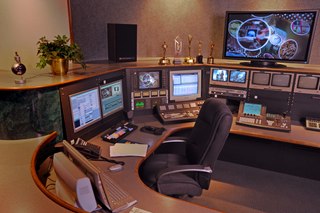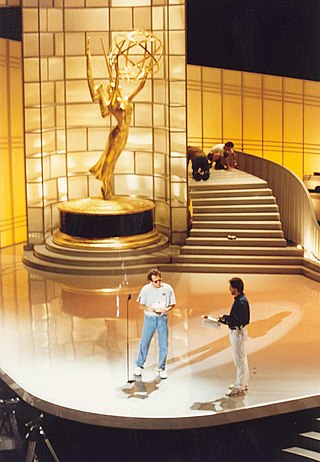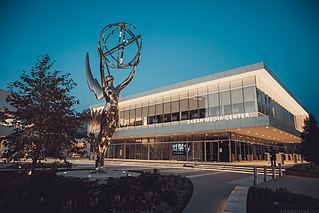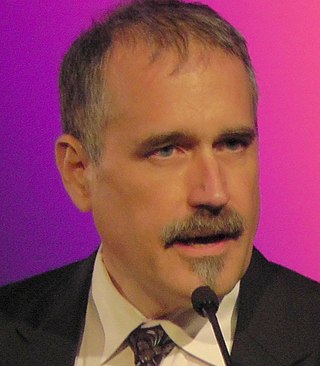Related Research Articles

Non-linear editing is a form of offline editing for audio, video, and image editing. In offline editing, the original content is not modified in the course of editing. In non-linear editing, edits are specified and modified by specialized software. A pointer-based playlist, effectively an edit decision list (EDL), for video and audio, or a directed acyclic graph for still images, is used to keep track of edits. Each time the edited audio, video, or image is rendered, played back, or accessed, it is reconstructed from the original source and the specified editing steps. Although this process is more computationally intensive than directly modifying the original content, changing the edits themselves can be almost instantaneous, and it prevents further generation loss as the audio, video, or image is edited.

The Emmy Awards, or Emmys, are an extensive range of awards for artistic and technical merit for the American and international television industry. A number of annual Emmy Award ceremonies are held throughout the calendar year, each with their own set of rules and award categories. The two events that receive the most media coverage are the Primetime Emmy Awards and the Daytime Emmy Awards, which recognize outstanding work in American primetime and daytime entertainment programming, respectively. Other notable U.S. national Emmy events include the Children's & Family Emmy Awards for children's and family-oriented television programming, the Sports Emmy Awards for sports programming, News & Documentary Emmy Awards for news and documentary shows, and the Technology & Engineering Emmy Awards and the Primetime Engineering Emmy Awards for technological and engineering achievements. Regional Emmy Awards are also presented throughout the country at various times through the year, recognizing excellence in local and statewide television. In addition, the International Emmy Awards honor excellence in TV programming produced and initially aired outside the United States.
Avid Technology Inc. is an American technology and multimedia company that develops digital non-linear editing (NLE) systems, video editing software, audio editing software, music notation software and management and distribution services. It is based in Burlington, Massachusetts, and was founded in August 1987 by Bill Warner.
Charles Stark "Doc" Draper was an American scientist and engineer, known as the "father of inertial navigation". He was the founder and director of the Massachusetts Institute of Technology's Instrumentation Laboratory, later renamed the Charles Stark Draper Laboratory, which made the Apollo Moon landings possible through the Apollo Guidance Computer it designed for NASA.

The Daytime Emmy Awards, or Daytime Emmys, are part of the extensive range of Emmy Awards for artistic and technical merit for the American television industry. Bestowed by the New York-based National Academy of Television Arts and Sciences (NATAS), the Daytime Emmys are presented in recognition of excellence in American daytime television programming. The first ceremony was held in 1974, expanding what was originally a prime time-themed Emmy Award. Ceremonies generally are held in May or June.

Simon "Si" Ramo was an American engineer, businessman, and author. He led development of microwave and missile technology and is sometimes known as the father of the intercontinental ballistic missile (ICBM). He also developed General Electric's electron microscope. He played prominent roles in the formation of two Fortune 500 companies, Ramo-Wooldridge and Bunker Ramo Corporation.

The Academy of Television Arts & Sciences (ATAS), also colloquially known as the Television Academy, is a professional honorary organization dedicated to the advancement of the television industry in the United States. It is a 501(c)(6) non-profit organization founded in 1946, the organization presents the Primetime Emmy Awards, an annual ceremony honoring achievement in U.S. primetime television.
The Technology and Engineering Emmy Awards, or Technology and Engineering Emmys, are one of two sets of Emmy Awards that are presented for outstanding achievement in engineering development in the television industry. The Technology and Engineering Emmy Awards are presented by the National Academy of Television Arts and Sciences (NATAS), while the separate Primetime Engineering Emmy Awards are given by its sister organization the Academy of Television Arts & Sciences (ATAS).
The Primetime Emmy Awards, or Primetime Emmys, are part of the extensive range of Emmy Awards for artistic and technical merit for the American television industry. Bestowed by the Academy of Television Arts & Sciences (ATAS), the Primetime Emmys are presented in recognition of excellence in American primetime television programming. The award categories are divided into three classes: the regular Primetime Emmy Awards, the Primetime Creative Arts Emmy Awards to honor technical and other similar behind-the-scenes achievements, and the Primetime Engineering Emmy Awards for recognizing significant contributions to the engineering and technological aspects of television. First given out in 1949, the award was originally referred to as simply the "Emmy Award" until the International Emmy Award and the Daytime Emmy Award were created in the early 1970s to expand the Emmy to other sectors of the television industry.

Edward John Neary was an American electronic engineer, specializing in audio processing equipment for motion pictures and broadcasting, as well as an Academy Award and Emmy Award winner.
The 59th Primetime Creative Arts Emmy Awards honored the best in artistic and technical achievement in American prime time television programming from June 1, 2006, until May 31, 2007, as chosen by the Academy of Television Arts & Sciences. The awards were presented on September 8, 2007, in a ceremony hosted by Carlos Mencia at the Shrine Auditorium in Los Angeles, California. The ceremony was broadcast by E! on September 15, preceding the 59th Primetime Emmy Awards on September 16. A total of 80 Creative Arts Emmys were presented across 66 categories.

Alan Conrad Bovik is an American engineer, vision scientist, and educator. He is a professor at the University of Texas at Austin (UT-Austin), where he holds the Cockrell Family Regents Endowed Chair in the Cockrell School of Engineering and is Director of the Laboratory for Image and Video Engineering (LIVE). He is a faculty member in the UT-Austin Department of Electrical and Computer Engineering, the Machine Learning Laboratory, the Institute for Neuroscience, and the Wireless Networking and Communications Group.
Christine L. Chen is an American journalist, the author of Amazon.com bestseller Happy-Go-Yoga, a certified yoga instructor, and the founder of Christine Chen Yoga. She is an adjunct instructor in communications at New York University's American Language Institute, and a regular blogger/contributor for The Huffington Post, Yoga Journal, HealthDay News, and Sonima.
The 57th Technology and Engineering Emmy Awards was held on 29 September 2005. The National Television Academy announced the winners at Bristol-Myers Squibb in Princeton, New Jersey.
Evertz Microsystems Limited is a Canadian multinational developer of software and hardware products and services for the broadcast and film industry. Evertz was founded in 1966 as DynaQuip Electron Devices Limited by Dieter and Rose Evertz, specializing in equipment for film timecode and closed captioning. The company was renamed Evertz Microsystems Limited from Evertz Technologies Limited in 1983. In 1997, it was purchased and reorganized by a group of former employees of Leitch Technology.
The 58th Technology and Engineering Emmy Awards was held on January 8, 2007. The National Television Academy announced the winners at The Venetian Hotel in Las Vegas. DIRECTV's Eddy Hartenstein received the Lifetime Achievement Award for his role in the company's becoming a global provider of digital television.
The 59th Technology and Engineering Emmy Awards was held on January 8, 2008 at the 2008 International Consumer Electronics Show in Las Vegas.
The Primetime Engineering Emmy Awards, or Engineering Emmys, are one of two sets of Emmy Awards that are presented for outstanding achievement in engineering development in the television industry. The Primetime Engineering Emmys are presented by the Academy of Television Arts & Sciences (ATAS), while the separate Technology and Engineering Emmy Awards are given by its sister organization, the National Academy of Television Arts and Sciences (NATAS).
The 73rd Primetime Creative Arts Emmy Awards honored the best in artistic and technical achievement in American prime time television programming from June 1, 2020, until May 31, 2021, as chosen by the Academy of Television Arts & Sciences. The awards were presented across three ceremonies on September 11 and 12, 2021, at the Event Deck at L.A. Live in Downtown Los Angeles, California, preceding the 73rd Primetime Emmy Awards on September 19. A total of 99 Creative Arts Emmys were presented across 92 categories. The ceremonies were produced by Bob Bain, directed by Rich Preuss, and broadcast in the United States by FXX on September 18.

The Children's and Family Emmy Awards, or Children's and Family Emmys, are a part of the extensive range of Emmy Awards for artistic and technical merit for the American television industry. Bestowed by the National Academy of Television Arts and Sciences (NATAS), the Children's and Family Emmys are presented in recognition of excellence in American children's and family-oriented television programming. The first ceremony took place on December 10 and 11, 2022, at Wilshire Ebell Theatre, Los Angeles. Awards for children's programming were previously presented at both the Daytime Emmys and the Primetime Emmys.
References
- ↑ "The Future of the 30-Second Spot (Published 2005)". The New York Times .
- ↑ Wall Street Journal
- ↑ list of awards Archived 2012-09-16 at the Wayback Machine
- ↑ National Academy of Television Arts and Sciences Outstanding Achievement in Technical/Engineering Development Awards Emmy Online list Archived 2007-10-11 at the Wayback Machine